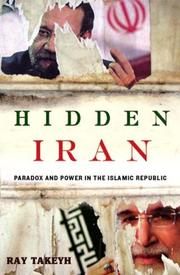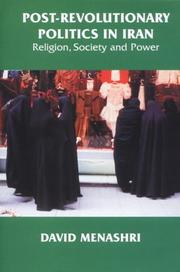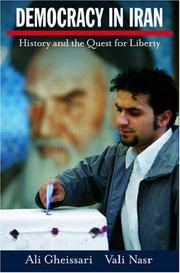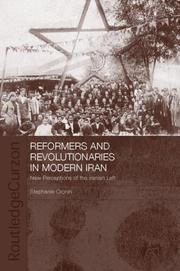| Listing 1 - 7 of 7 |
Sort by
|

ISBN: 9780805079760 0805079769 Year: 2006 Publisher: New York Times books
Abstract | Keywords | Export | Availability | Bookmark
 Loading...
Loading...Choose an application
- Reference Manager
- EndNote
- RefWorks (Direct export to RefWorks)
A leading expert explains why we fail to understand Iran and offers a new strategy for redefining this crucial relationship For more than a quarter of a century, few countries have been as resistant to American influence or understanding as Iran. The United States and Iran have long eyed each other with suspicion, all too eager to jump to conclusions and slam the door. What gets lost along the way is a sense of what is actually happening inside Iran and why it matters. With a new hard-line Iranian president making incendiary pronouncements and pressing for nuclear developments, the consequences of not understanding Iran have never been higher. Ray Takeyh, a leading expert on Iran's politics and history, has written a groundbreaking book that demystifies the Iranian regime and shows how the fault lines of Iran's domestic politics serve to explain its behavior. In 'Hidden Iran', he explains why this country has so often confounded American expectations and why its outward hostility does not necessarily preclude the normalization of relations. Through a clearer understanding of the competing claims of Muslim theology, republican pragmatism, and factional competition, he offers a new paradigm for managing our relations with this rising power.
Iran --- Politics and government --- Foreign relations --- IranPolitics and government

ISBN: 0714650749 0714681210 Year: 2001 Publisher: London Cass
Abstract | Keywords | Export | Availability | Bookmark
 Loading...
Loading...Choose an application
- Reference Manager
- EndNote
- RefWorks (Direct export to RefWorks)
Politics --- Iran --- Politics and government --- Foreign relations --- Politique et gouvernement --- Relations extérieures --- IranPolitics and government --- Relations extérieures

ISBN: 9780195189674 0195189671 Year: 2006 Publisher: Oxford : Oxford university press,
Abstract | Keywords | Export | Availability | Bookmark
 Loading...
Loading...Choose an application
- Reference Manager
- EndNote
- RefWorks (Direct export to RefWorks)
Today Iran is once again in the headlines. Reputed to be developing nuclear weapons, the future of Iraq's next-door neighbor is a matter of grave concern both for the stability of the region and for the safety of the global community. President George W. Bush labeled it part of the "Axis of Evil," and rails against the country's authoritarian leadership. Yet as Bush trumpets the spread of democracy throughout the Middle East, few note that Iran has one of the longest-running experiences with democracy in the region. In this book, Ali Gheissari and Vali Nasr look at the political history of Iran in the modern era, and offer an in-depth analysis of the prospects for democracy to flourish there. After having produced the only successful Islamist challenge to the state, a revolution, and an Islamic Republic, Iran is now poised to produce a genuine and indigenous democratic movement in the Muslim world. Democracy in Iran is neither a sudden development nor a western import, Gheissari and Nasr argue. The concept of democracy in Iran today may appear to be a reaction to authoritarianism, but it is an old idea with a complex history, one that is tightly interwoven with the main forces that have shaped Iranian society and politics, institutions, identities, and interests. Indeed, the demand for democracy first surfaced in Iran a century ago at the end of the Qajar period, and helped produce Iran's surprisingly liberal first constitution in 1906. Gheissari and Nasr seek to understand why democracy failed to grow roots and lost ground to an autocratic Iranian state. Why was democracy absent from the ideological debates of the 1960s and 1970s? Most important, why has it now become a powerful social, political, and intellectual force? How have modernization, social change, economic growth, and the experience of the revolution converged to make this possible? Gheissari and Nasr trace the fortunes of the democratic ideal from the inchoate demands for rule of law and constit
Political systems --- anno 1900-1999 --- Iran --- Democracy --- Démocratie --- Politics and government --- Politique et gouvernement --- Geografie --- Sociale geografie --- Politieke Geografie. --- GeografieSociale geografie --- Politieke Geografie.IranPolitics and government --- Démocratie

ISBN: 1862031177 Year: 2000 Publisher: Washington DC :
Abstract | Keywords | Export | Availability | Bookmark
 Loading...
Loading...Choose an application
- Reference Manager
- EndNote
- RefWorks (Direct export to RefWorks)
Islam and politics --- Islam et politique --- Iran --- Politics and government --- Politique et gouvernement --- Democratization --- Political culture --- Political cultureIran --- IranPolitics and government
Book
ISBN: 2221105060 Year: 2006 Publisher: Paris : Robert Laffont,
Abstract | Keywords | Export | Availability | Bookmark
 Loading...
Loading...Choose an application
- Reference Manager
- EndNote
- RefWorks (Direct export to RefWorks)
Iran --- Politics and government --- Foreign relations --- Social life and customs --- Politique et gouvernement --- Relations extérieures --- Moeurs et coutumes --- IranPolitics and government --- Relations extérieures

ISBN: 0415331285 Year: 2004 Volume: *1 Publisher: London New York RoutledgeCurzon
Abstract | Keywords | Export | Availability | Bookmark
 Loading...
Loading...Choose an application
- Reference Manager
- EndNote
- RefWorks (Direct export to RefWorks)
Gauche et droite (Science politique) --- Links en rechts (Politieke wetenschap) --- Right and left (Political science) --- Revolutionaries --- Social reformers --- Islam and politics --- Révolutionnaires --- Réformateurs sociaux --- Droite et gauche (Science politique) --- Islam et politique --- Iran --- Politics and government --- Politique et gouvernement --- Islam et politiqueIran --- IranPolitics and government --- Révolutionnaires --- Réformateurs sociaux --- 20th century
Book
ISBN: 9780870032684 9780870032677 0870032674 0870032682 Year: 2012 Publisher: Washington (D.C.): Carnegie endowment for international peace,
Abstract | Keywords | Export | Availability | Bookmark
 Loading...
Loading...Choose an application
- Reference Manager
- EndNote
- RefWorks (Direct export to RefWorks)
Nuclear nonproliferation --- Nuclear weapons --- Mousavian, Seyyed Hossein, --- Iran --- Politics and government --- Foreign relations --- Nuclear weaponsMousavian, Seyyed Hossein,Iran --- IranPolitics and government --- Nuclear nonproliferation - Iran --- Nuclear weapons - Iran --- Mousavian, Seyyed Hossein, - 1967 --- -Iran - Politics and government - 1997 --- -Iran - Foreign relations - 1997 --- -Nuclear nonproliferation --- -Iran
| Listing 1 - 7 of 7 |
Sort by
|

 Search
Search Feedback
Feedback About UniCat
About UniCat  Help
Help News
News